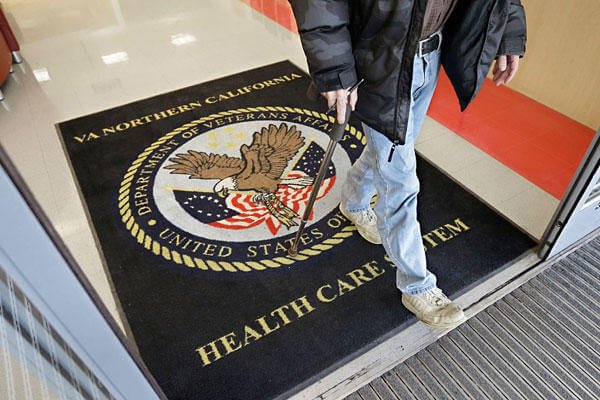 Military Update: The nation’s leading veteran services organizations are rallying behind the Department of Veterans Affairs and its beleaguered health care system, touting the experience of staff, the breadth of services and its holistic approach to care delivery that they argue the private sector cannot match.
Military Update: The nation’s leading veteran services organizations are rallying behind the Department of Veterans Affairs and its beleaguered health care system, touting the experience of staff, the breadth of services and its holistic approach to care delivery that they argue the private sector cannot match.
The VSOs are warning of politicians and groups with agendas that constantly criticize VA health care, refuse to acknowledge reforms and thus advance a camouflaged campaign to dismantle VA health care. They also say it is time to better educate their own members on actions being taken to improve to the healthcare system that millions of veterans rely upon.
The rally of vet groups is taking shape informally for now. It’s no coincidence that it occurs amid a presidential campaign, and with the congressionally chartered Commission on Care days away from releasing its report on modernizing veterans’ health services over the next 20 years.
Last March, seven of the 15 health advisors appointed to the commission backed a “strawman” proposal that would shut down all VA medical centers and outpatient services, and have their six million patients a year get medical care in the private sector.
Journalist Bryant Jordan of military.com first reported that the idea of shifting more veterans’ care into the private sector is now a draft bill of Rep. Cathy McMorris Rodgers (R-Wash.), the Caring for Our Heroes in the 21st Century Act. It would turn the Veterans Health Administration into a federally chartered organization run by a board of directors, which would coordinate with for-profit insurance companies to offer veterans full access to private sector care as an alternative to their VA-provided care.
McMorris Rodgers’ “discussion draft” is defended by and likely was drafted by Concerned Veterans of America (CVA), a lobby group funded by the billionaire Koch brothers who seek to reduce VA costs and bureaucracy. CVA has influential backers among Republicans, including Rep. Jeff Miller (R-Fla.), chairman of the House Veterans Affairs Committee, who has invited CVA representatives to testify alongside veteran service organizations.
Miller’s committee turned a national spotlight on the 2014 patient wait-list scandal uncovered at scores of VA hospitals and medical centers. Since then, it has demanded that VA officials be held accountable and that executives be jailed or at least fired for their wrongdoing. Meanwhile, VA leaders fumbled with a maze of employee protections and legal challenges.
Combined with some highly critical inspector general reports on VA health administration, the committee effectively branded the VA medical system as wasteful, poorly led and a danger to veterans. All of the hearings, investigations and negative news articles lent credibility to CVA’s narrative that the system can’t be repaired and so must be replaced.
CVA says the McMorris Rodgers bill is the “real reform” VA needs. It would curb costs for taxpayers, in part, because veterans who choose to use outside care would get only “premium support to help cover” their insurance.
The draft bill prompted Veterans of Foreign Wars to warn its members that “Politicians, pundits and politically-motivated organizations are using the national crisis in access to care” at VA to justify dismantling the healthcare system, privatizing care and “even proposing that veterans be charged for their service-connected care.”
When Paralyzed Veterans of America weighed in, CVA accused it of mischaracterizing the bill and said its “D.C. insider-leadership…is willing to lie and mislead veterans about the solutions being proposed to deliver more timely care.”
That attack on PVA put more veteran groups on a war footing. The American Legion wrote a letter to every member of Congress tearing into CVA, though without mentioning the Koch-funded group by name. Legion National Commander Dale Barnett complained of “egregious and politically-driven comments” from those claiming to represent veterans’ needs and yet showing “little concern for the millions of veterans who rely on VA care and support that they receive at their local facilities.”
The Legion becomes alarmed, Barnett wrote, “when politically-motivated groups masquerade as veteran-centric organizations, exploiting the public's generosity and patriotism by broadcasting fallacies and spouting half-truths.” Groups like this exists “to influence policy decisions in favor of self-serving agendas to defund government programs, starting with VA.”
VA Secretary Bob McDonald, in a speech Monday, described progress in cutting wait times for health appointments as it relies more heavily on coordinated care in the private sector. In March, he said, VA approved 370,000 authorizations for private sector care, doubling the number from a year ago. Just the March authorizations, many to cover entire episodes of care, will result in a total of two million private sector appointments.
“So the idea that VA can’t be fixed, or that we’re not fixing it, is just nonsense. We are fixing it. We’re just not finished yet,” McDonald said.
Tuesday, at a summit on VA healthcare co-hosted by the AFL-CIO Union Veterans Council, more VSO executives touted the strength of their partnership with VA and its commitment to improving access and quality of care. Again, they were sharply critical of politicians and groups seeking to dismantle VA healthcare. Citing surveys showing that most veterans are satisfied with VA care and its holistic approach to overall health, the groups agreed they must challenge a false portrait of VA care as painted by recent scandals, partisan politicians and the drumbeat of negative news reports.
Garry Augustine, executive director of Disabled American Veterans, said he talked to an advisor to a presidential candidate “who told me I’m the first veteran he’s heard from that had anything good to say about the VA. That made me realize…the perception war is being lost.”
Augustine said he urged that adviser to be open to “a different perspective than what they are hearing in the news or from certain organizations that may have a political agenda. I’ve got to tell you, I don’t think I won that discussion,” he said.
Lauren Augustine, legislative associate with Iraq and Afghanistan Veterans of America (no relation to Garry), said her advice to presidential candidates would start with a plea to understand “veterans are more than political chew toys. They are more than the two dominating narratives we hear in the media, of heroic [figure] or PTSD injured veteran. We are more than that and we need you…to seek our voice on the nation’s stage.”
Send comments to Military Update, P.O. Box 231111, Centreville, VA, 20120, email milupdate@aol.com or twitter: Tom Philpott @Military_Update.
# # # #
Tom Philpott has been breaking news for and about military people since 1977. After service in the Coast Guard, and 17 years as a reporter and senior editor with Army Times Publishing Company, Tom launched "Military Update," his syndicated weekly news column, in 1994. "Military Update" features timely news and analysis on issues affecting active duty members, reservists, retirees and their families.
Visit Tom Philpott's Military Update Archive to view his past articles.
Tom also edits a reader reaction column, "Military Forum." The online "home" for both features is Military.com.
 Tom's freelance articles have appeared in numerous magazines including The New Yorker, Reader's Digest and Washingtonian.
Tom's freelance articles have appeared in numerous magazines including The New Yorker, Reader's Digest and Washingtonian.
His critically-acclaimed book, Glory Denied, on the extraordinary ordeal and heroism of Col. Floyd "Jim" Thompson, the longest-held prisoner of war in American history, is available in hardcover and paperback.




